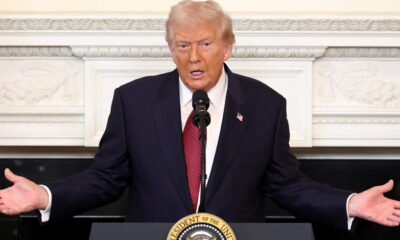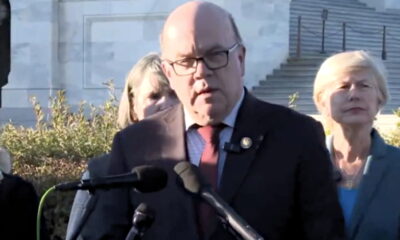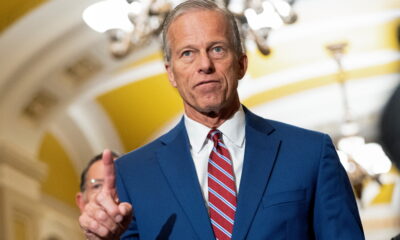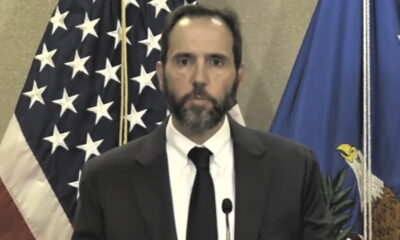CORRUPTION
Josh Hawley Says ‘Only’ SCOTUS ‘Issues Rules for Whole Country’, Despite Constitution
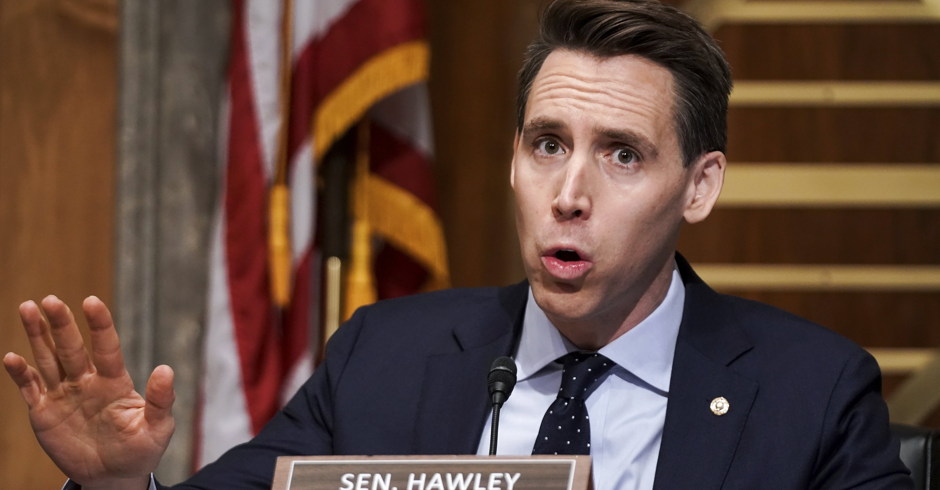
Senator Josh Hawley (R-MO) vowed to file legislation stopping federal district judges from ruling on orders issued by President Donald Trump. He claims it’s outside of their jurisdiction—but the Constitution disagrees.
On Wednesday, Hawley appeared on The Charlie Kirk Show to slam district judges who have issued injunctions against the Trump administration’s acts, including the mass firings of federal workers and the rollback of DEI initiatives.
“These are district courts, local federal courts, that are saying, ‘I’m not just going to issue an order that says what the executive branch can or cannot do in my district, I’m going to issue an order that binds the executive branch for the entire nation,'” Hawley said.
READ MORE: Conservative Rains Hell on ‘Dishonest’ and ‘Scummy’ Josh Hawley
“That is not a power that I think district courts have… what needs to happen is one of two things: Either the Supreme Court needs to intervene and make clear there’s only one court that can issue rules for the whole country, that’s the Supreme Court, that’s why we only have one of them. And or, if they won’t do that, Congress needs to legislate and make clear that district courts do not have the ability to issue these kinds of injunctions.”
Sen. Josh Hawley SLAMS local district court judges issuing national injunctions on the Trump admin, calls for SCOTUS or Congress to intervene:
"These are district courts, local federal courts, that are saying, 'I'm not just going to issue an order that says what the executive… https://t.co/e1lzI3cSP5 pic.twitter.com/0KzcpkkxnW
— Charlie Kirk (@charliekirk11) March 19, 2025
On Thursday, Hawley vowed on X (formerly Twitter) to file legislation that would strip power from district court judges, keeping them from issuing these sorts of injunctions.
“District Court judges have issued RECORD numbers of national injunctions against the Trump administration – a dramatic abuse of judicial authority. I will introduce legislation to stop this abuse for good,” he wrote, declining to include any details on what that legislation may look like.
Article III of the U.S. Constitution lays out the American judicial system. While the Supreme Court is the final authority, it is primarily an appellate court—meaning that lower courts make initial rulings which are then appealed up the chain. The Supreme Court can only be the original court in cases involving “Ambassadors, other public Ministers and Consuls, and those in which a State shall be Party,” the Constitution reads.
District Courts are the lowest level of federal courts, and there are 94 of them throughout the U.S., with each state getting at least one, as well as the District of Columbia. Much like the state courts, district courts hear criminal cases—when federal crimes have been committed—as well as civil cases. Civil cases deal with legal and constitutional conflicts; the type of cases Hawley is referring to here.
As an example, let’s look at the recent case involving Trump’s attempt to ban transgender people from serving in the military. In a case like this, the judge can issue an injunction, which puts Trump’s order on hold, until it can be heard by the courts.
It all starts with a lawsuit—in this case, Talbott v. Trump. Talbott was initially filed by six active service members and another two people who wanted to enlist. The plaintiffs said that Trump’s executive order would keep them out of the military illegally; the defendant, the Department of Justice, disagrees, saying the order is legal.
Whether or not to issue an injunction is up to the particular judge. If the judge declines to issue an injunction, the government could continue to act on Trump’s EO. In this particular case, U.S. District Court Judge Ana Reyes put an initial injunction on the order earlier this week. This keeps everything in a holding pattern; transgender people can remain in the military until the case is decided.
Given Reyes’ comments, it’s likely that she will rule that the EO is illegal. If the Justice Department chooses not to appeal the ruling, it will stand just as if the Supreme Court ruled on it. Of course, this is unlikely—the DOJ will almost certainly appeal. The case then heads to one of the 13 appellate courts.
Appellate courts review the original ruling. Often, both sides are given a brief time to argue their case—usually 15 minutes, according to the official U.S. Courts webpage—but not always. Sometimes, appellate courts look only at the written briefs in the case. Unlike district courts, appellate courts are ruled over by a panel of judges rather than just one.
The judicial panel will decide whether or not the original judge made an error in legal reasoning. The appellate court can decide whether to let the decision stand, to overturn it, or to send the case back to the district courts.
In this case, if Reyes rules in favor of the plaintiffs, and the appellate court upholds her ruling, the injunction keeping trans people in the military still stands. If the appellate court overturns the ruling, the injunction may still stand, if the plaintiffs decide to appeal. If the plaintiffs don’t choose to appeal, then the injunction would be lifted and Trump’s EO would be reinstated.
Either party can file a “writ of certiorari”, which asks that the Supreme Court to decide the case. So, in Talbott, it’s likely that either way the appellate court rules, either the DOJ or the plaintiffs would ask the Supreme Court to weigh in. The injunction would still stand until the Supreme Court either declines to take the case, or ultimately rules on it. At that point, whatever the Supreme Court decides would stand.
Image via Shutterstock
Enjoy this piece?
… then let us make a small request. The New Civil Rights Movement depends on readers like you to meet our ongoing expenses and continue producing quality progressive journalism. Three Silicon Valley giants consume 70 percent of all online advertising dollars, so we need your help to continue doing what we do.
NCRM is independent. You won’t find mainstream media bias here. From unflinching coverage of religious extremism, to spotlighting efforts to roll back our rights, NCRM continues to speak truth to power. America needs independent voices like NCRM to be sure no one is forgotten.
Every reader contribution, whatever the amount, makes a tremendous difference. Help ensure NCRM remains independent long into the future. Support progressive journalism with a one-time contribution to NCRM, or click here to become a subscriber. Thank you. Click here to donate by check.
 |

